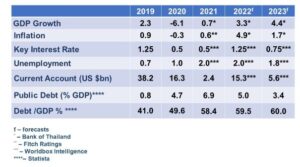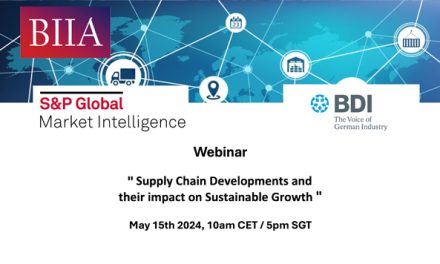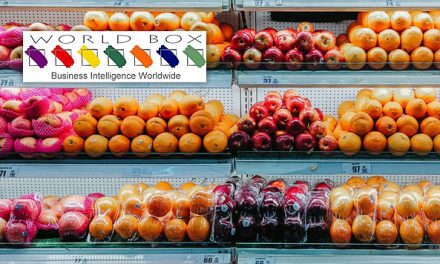Worldbox Intelligence Risk Rating September 2022
THAILAND
Overall score 20 – Stable
Political risk: Stable 6 /10
Economic risk: Stable 7/10
Commercial risk: Stable 7/10
The risk assessment of a country is made up of 3 components, being Political, Economic and Commercial. Each component is scored out of 10 with 1 being the lowest risk and 10 the highest.
Political Risk – Stable at 6
Political uncertainty remains at high levels in Thailand. In September 2022, the country’s Constitutional Court ruled that Prime Minister Prayuth Chan-Ocha, who it suspended in August, had not exceeded the maximum eight years allowed in the post, paving the way for his likely return to power. The former army chief first took power in a 2014 coup and stayed on following an election in 2019. The court issued its September ruling after deliberating on whether Prayuth had exceeded an eight-year term limit added into the post-coup constitution. That provision was intended to prevent popular elected leaders from holding power too long, particularly after the army forcibly removed Thaksin Shinawatra in 2006 and his sister, Yingluck Shinawatra, in 2014.
Opposition parties have continually questioned the legitimacy of Prayut, who seized power in the 2014 military coup, but the Constitutional Court decision was surprising, given that its members are largely picked by a military-appointed Senate. There have been regular street protests demanding a new constitution, the dissolution of parliament, a halt to perceived intimidation of political dissidents, and reform of the monarchy.
The court’s decision to suspend Prayuth fuelled speculation that Thailand’s royal establishment and elements of the military are looking to replace Prayuth ahead of the next general election, which must be held by March 2023. The military-backed coalition will face a serious challenge from the Pheu Thai party (PTP) backed by former prime minister Thaksin, whose allies have won the most seats in every national vote over the past 21 years. Thaksin is widely regarded as the de facto leaders of the PTP, the largest individual party in the lower house of parliament. Polls show Prayuth is deeply unpopular with the economy headed for the slowest expansion in Southeast Asia this year.
Meanwhile, the divisions between the Red Shirts and Yellow Shirts, that has dominated Thai politics in recent decades is fading. The Red-shirts began as supporters of deposed former Prime Minister Thaksin Shinawatra, who was ousted by a military coup in September 2006. This support transferred to the PTP, while the Yellow-shirts represent those opposed to Mr Thaksin and they were the force behind the street protests that led to the 2006 coup. Most Thais are now simply united against the current authoritarian “hybrid democracy”, where military and ex-military leaders exert significant control.
Economic Risk – Stable at 7
The outlook for the economy is improving despite Thailand’s reliance on international tourism, which accounted for around 22% of national income, and was battered by the pandemic. The country saw foreign tourist arrivals plunge to 6.7 million in 2020 and to just 400,000 in 2021, from the almost 40 million visitors who generated more than US$60 billion in revenue in 2019.
However, positive changes that point to a rebalancing of the economy appear to be underway. Foreign investment is rising and exports are surging towards record levels. Exports rose by 17.1% in 2021, the highest growth seen in 11 years, led by autos and autoparts, iron and steel products, IT equipment and chemicals. That helped the country record an annual trade surplus of US$3.57 billion.
A number of factors explain Thailand´s export-led manufacturing rebound, and its growing appeal to investors. The depreciation of the Thai baht has boosted competitiveness as global trade accelerates from the severe pandemic associated lockdowns of 2020.
Thailand is also benefiting from Sino-US trade tensions with foreign and Chinese companies shifting production from China to countries such as Thailand, particularly in the automotive and parts, electronics, and platform and digital information cloud services industries.
Thailand offers many particular attractions as an alternative source of production to China. It is home to the second largest domestic market in Southeast Asia, which has been growing rapidly for decades. It is already one of Asia’s major automotive, electronics and petrochemical production hubs with relatively good infrastructure and an attractive business climate in terms of the Ease of Doing Business and receptiveness to foreign direct investment (FDI).
The latest figures certainly suggest investment in Thailand is booming. The combined value of foreign and local applications for investment in 2021 rose by 59% to 643 billion baht. This was led by an increase in FDI in tech sectors and more projects in the bio-, circular and green industries, as well as a continued focus on the power generation sector. FDI accounted for around 71% of total investment with Japan, China and Singapore being the main sources of these funds. The Thai Board of Investment said it was seeing constant growth in foreign investments in sectors such as smart electronics, speciality chemicals, bioplastics and the medical cluster.
However, the economy continues to face long-term challenges that were evident before the pandemic, reports the IMF. In 2019, Thailand recorded its lowest growth in five years, having trailed regional peers for the better part of a decade. This, the IMF argued in its 2021 Article IV Consultation, reflects “low productivity growth and lacklustre human and physical capital accumulation, high household debt, and weak social safety nets. Inequality and informality remain high, and a savings-investment imbalance persists”. The upturn in investment will hopefully address some of these problems.
Commercial Risk – Stable at 7
Thailand has made significant gains in the World Bank’s Ease of Doing Business index in recent years, rising to 21st position out of 190 economies in 2020, from 46th position in 2016. That is considerably better than the average emerging and developing Asian country rating of 95. However, Thailand remains less competitive than its neighbours Malaysia (in 12th position) and Singapore (2nd), partly due to gaps in educational outcomes and labour skills shortages.
The country ranked 104th out of 180 countries in Transparency International’s 2021 Corruption Perceptions Index. Thailand tied with Vietnam in 104th place, two spots behind Indonesia. Malaysia ranked 57th, with a score of 51 points. Thailand was placed ahead of the Philippines (115th), Laos (134th), Myanmar (137th) and Cambodia (160th) in Southeast Asia.
A national survey in 2017 found that almost 80 per cent of Thais believed most or all of the police force was corrupt, while half of Thais felt that most or all local government councillors were corrupt. Businesses and individuals reportedly commonly pay irregular payments and bribes in order to obtain favourable judicial decisions.
The country ranks 42nd in terms of economic freedom, according to the Heritage Foundation’s 2021 index. Its overall score increased by 0.3 points, primarily because of an improvement in business freedom. Thailand is ranked 9th among 40 countries in the Asia–Pacific region, and its overall score is above the regional and world averages.
The Thai government has invested heavily in expanding and improving its infrastructure networks over the past decades. Severe road congestion remains a problem in Bangkok, which accounts for half of Thailand’s GDP, but the country has made significant strides in improving its digital infrastructure. Since the beginning of the COVID-19 pandemic, mobile internet speeds have improved by 81% and now average 40.79 Mbps, according to an analysis by Surfshark. At the same time, broadband speeds have increased by 29% and now average 189.54 Mbps – the second best in the world. According to Surfshark’s Digital Quality of Life Index for 2021, Thailand ranks third in Southeast Asia (behind Singapore and Malaysia) in terms of internet affordability, internet quality, e-infrastructure, e-security and e-government.
September 2022 Bulletin
Political Risk – Stable 6 out of 10
Following the Constitutional Court’s decision to suspend Prime Minister Prayuth Chan-Ocha in August, various possible scenarios could unfold in the coming months. The Court is now deliberating whether Prayuth exceeded the eight-year constitutional term limit added into the post-coup constitution. Prayuth and his supporters say his term in office should be measured from July 2019 when he was named as prime minister of a civilian administration and after the new constitution came into effect. The opposition says his period in office began following the 2014 coup and, according to the eight-year limit, ran out in August 2022.
If the court decides Prayuth’s term started in June 2019, when he was named prime minister of a civilian government, then he can still serve another full four-year term. But if it puts the start date at April 2017, when the constitution became effective, then it is more likely that Prayuth will be replaced by the ruling party before the next election in 2023.
If, on the other hand, the court rules that Prayuth has exceeded his terms in office and can no longer serve as prime minister, the situation becomes more complicated. Prayuth might try and stay on as caretaker prime minister. Such an outcome could well spark street protests. Alternatively, if Prayuth does step aside permanently, the House of Representatives and the Senate must select a new leader from a list approved before the 2019 polls, and Prayuth was the only military-friendly candidate on that list.
However, if none of the candidates get more than half the votes, parliament can nominate other candidates with the support of two-thirds of the combined National Assembly. That could result in the nomination of Deputy Prime Minister Prawit Wongsuwan, another former army chief who is now serving as caretaker prime minister while Prayuth is suspended.
Yet another possible outcome is that Prayuth resigns as prime during his suspension. This means the whole cabinet would step into a caretaker capacity until lawmakers and the Senate select a new prime minister. Constitutionally, it is unclear whether Prayuth could stay on as interim prime minister, given he has been suspended. So, the most likely outcome is that Prawit would stay on as caretaker after Prayuth resigns.
It is even possible that the Constitutional Court could delay issuing a ruling until after the current government’s term ends in March next year. This could also fuel further protests. It would also leave Prayuth’s status unclear heading into the next election, raising the prospect that the ruling party opts for another candidate to end the uncertainty.
However, delaying making a ruling for so long would make little sense given his suspension was probably aimed at lowering the political temperature in Thailand, which is already at very high levels. Economic hardship has sparked unrest among working class Thais and young protestors, united by anger at the military´s poor management of the economy and the pandemic. Sharp increases in the price of staple goods such as pork and noodles, is sparking further dissatisfaction with the government.
Economic Risk – Stable 7 out of 10
The economy grew by 2.4% in the first half of 2022, according to the National Economic and Social Development Council (NESDC). Economic growth accelerated from 2.2% in the first quarter to 2.4% in the second quarter, powered by robust exports, which account for more than 60% of the country’s GDP, and the revival of tourism, which contributes a further 15%.
The Bank of Thailand, the country’s central bank, is forecasting 3.3% growth in 2022 on the prospect that exports and tourism will continue to recover, though rising inflation – and interest rates – remains a headwind. Economic activity is expected to return to pre-pandemic levels by early 2023 according to the Bank of Thailand.
In the first half of the year, exports soared by 12.7% to US$149 billion, compared to the same period last year. The number of international tourists is expected to rise to up to 10 million in 2022, with a sharp upswing in the second half of the year, before increasing further to around 19 million arrivals in 2023 – still just half the pre-pandemic 2019 level. Chinese tourists accounted over a quarter of the overall number of overseas visitors to Thailand in 2019. China continues to implement measures that are significantly curbing overseas travel and this situation is unlikely to change this year.
Thailand has maintained close economic ties with Russia despite Moscow’s invasion of Ukraine. Russia is not a significant trade partner, with bilateral trade amounting to just US$2.7bn in 2021. However, by raising the piece of key commodities, particularly energy and fertilizers, the war has hampered economic growth.
Higher global interest rates pose the main threats to the economic outlook in 2022. Much depends on prospects for inflation and interest rates in the US. If the Federal Reserve raises borrowing costs significantly to contain inflation this year, the Bank of Thailand (BoT) will have little option but to follow suit to stem capital outflows. At the end of 2021, foreign investors held 1.03 trillion baht of Thai debt instruments. The BoT will act to ensure this capital does not leave the country in search of higher yields elsewhere.
In August 2022, the BOT raised interest rates by 25 basis points, the first increase since 2018, to 0.75%. Its monetary policy committee (MPC) said further hikes would be carried out “in a gradual and measured manner consistent with the growth and inflation outlook”.
Consumer prices rose 7.61% in July from a year earlier, far above the BOT’s target range of 1-3%. The Bank said it expected inflation to remain high for the rest of the year before gradually falling to its target range in 2023 as supply-side price pressures eased.
In June 2022, Fitch Ratings Fitch forecast the general government deficit would gradually narrow to 5.3% of GDP in the fiscal year ending-September 2022, and 3.7% the following year, from an estimated 7.0% in fiscal 2021. A narrower fiscal deficit reflects stronger revenue collection and a measured unwinding of pandemic-related economic relief measures.
Commercial Risk – Stable 7 out of 10
In June 2022, Fitch Ratings affirmed Thailand’s Long-Term Foreign-Currency Issuer Default Rating at ‘BBB+’ with a Stable Outlook. Fitch said the country’s sustained external finance strengths and strong macroeconomic policy framework underpinned the rating. However, it also reflected weaker structural features relative to ‘BBB’ peers, including lower per capita income and World Bank governance scores. Moreover, medium-term prospects for growth and fiscal consolidation are constrained by adverse demographic factors and potential scarring from the Covid-19 pandemic, the agency added.
In August 2022, Fitch said that the outlook for Thailand’s banks was improving. The agency said that Thailand’s large banks would benefit from the gradual recovery from the weak economic environment of 2020-2021. Increased business activity and stable, or slightly improving, net interest margins would support bank revenue. Thailand’s six domestic systemically important banks comprise the bulk of the banking system, with a combined deposit market share of around 84%.
Latest economic data
About Worldbox Business Intelligence
An independent service, Worldbox Business Intelligence provides online company credit reports, company profiles, company ownership and management reports, legal status and history details, as well as financial and other business information on more than 50 million companies worldwide, covering all emerging and major markets.
Worldbox was founded in the 1980s, with the vision to become a global business provider. Its ability to deliver data in multiple languages in a standard format has strengthened its brand.
Copyright (C) 2022 Worldbox Business Intelligence. All rights reserved.
Our mailing address is:
Worldbox Business Intelligence
Breitackerstrasse 1
Zollikon
Zurich 8702
Switzerland






























